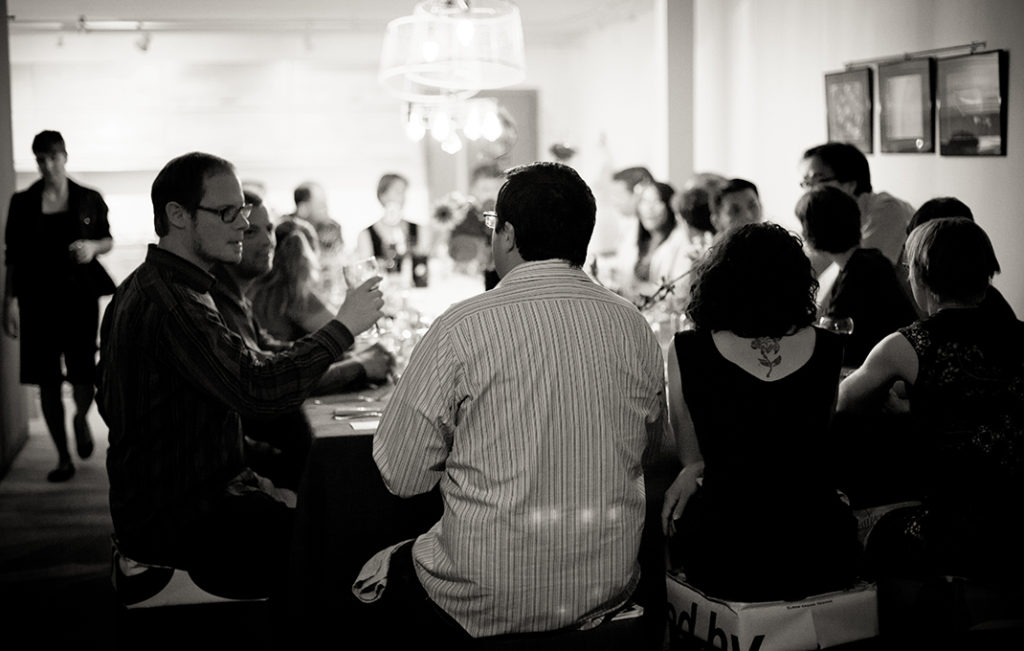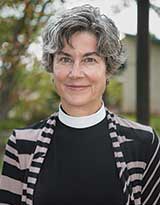
“The long conversation” is one way I refer to the Bible in my New Testament courses. The Bible is a record of thousands of years of conversation about and insights into a particular people’s experiences of God. I’m astonished when people speak of the coherence of the biblical texts—have they ever read the whole thing?
The Bible is like a loud four-thousand-year dinner party full of both your favorite relatives and also the crazy aunts and uncles who make you want to retreat to the kitchen. It can be hard to tell when some of them are being sarcastic or ironic or funny. They have their own lives, their own traumas, outside the dinner party—sorrows you can only guess at by the kinds of stories they tell. Terrible things, even shameful things are spoken of. Yet sometimes in the midst of the din there is a ladder full of angels, ascending and descending between heaven and earth.
That long conversation is a model for me of what I want to inspire not only in my classroom, but on our campus, in our churches and cities, even in our nation. Though the Church did not preserve every voice, there was resistance to purged and homogenized versions of the scriptures, such as that of Marcion. From the pages between the covers of the Bible rise a multitude of distinct and even discordant voices. How many of us are willing to be so generous with the voices around us? How willing are we to see in each person’s frank speech traces of the same God at work?
In her presidential address for the Society of Biblical Literature last fall, Beverly Gaventa quoted a question from Simone Weil: “What is this text going through?” The quotation comes from a study of the Iliad as a “poem of force” that Weil wrote during the Nazi era, 1941. While Weil never discusses Hitler or Nazism, her study unmasks the insidious working of power-over that turns people into things. What she was experiencing around her no doubt gave her insight into the experiences of subjugation to power that are reflected in the Iliad.
Gaventa extends Weil’s generosity, “What is this text going through?” to a study of the difficult and confusing passage, Romans 13:1-7. And then she suggests that we make the same move in our conversations with the people around us: “It is a simple question, naïve really, yet it has the potential to draw us into a constructive, generous listening and learning, both of our texts and of one another.”
Interpreting the scriptures is ultimately an act of human relationship, an attempt to join the conversation by both listening and speaking, aware that everything we say and everything we hear is shaped by what we and others have been through. This is the best invitation we are ever likely to get, because all night long at this intense and rambling dinner party God is speaking and listening, too.
What have you been through that colors how you interpret current events?
What experiences do you have of someone else making room for your voice and your story?
How can we use what we have gone through as a point of connection with one another, rather than as a point of conflict?
 Jane Patterson (@JaneLPatterson1) served on the Adjunct Faculty since 2010 and was appointed assistant professor of New Testament beginning June 1, 2013. In the Master of Divinity program, she teaches courses in Bible and Spiritual Formation; in the Center for Christian Ministry and Vocation, she teaches a course on the Bible as a resource for pastoral caregivers. Outside the seminary, she is co-director of a ministry called The WorkShop that guides laity in the use of the scriptures for discerning how to live faithfully in all aspects of daily life.
Jane Patterson (@JaneLPatterson1) served on the Adjunct Faculty since 2010 and was appointed assistant professor of New Testament beginning June 1, 2013. In the Master of Divinity program, she teaches courses in Bible and Spiritual Formation; in the Center for Christian Ministry and Vocation, she teaches a course on the Bible as a resource for pastoral caregivers. Outside the seminary, she is co-director of a ministry called The WorkShop that guides laity in the use of the scriptures for discerning how to live faithfully in all aspects of daily life.

